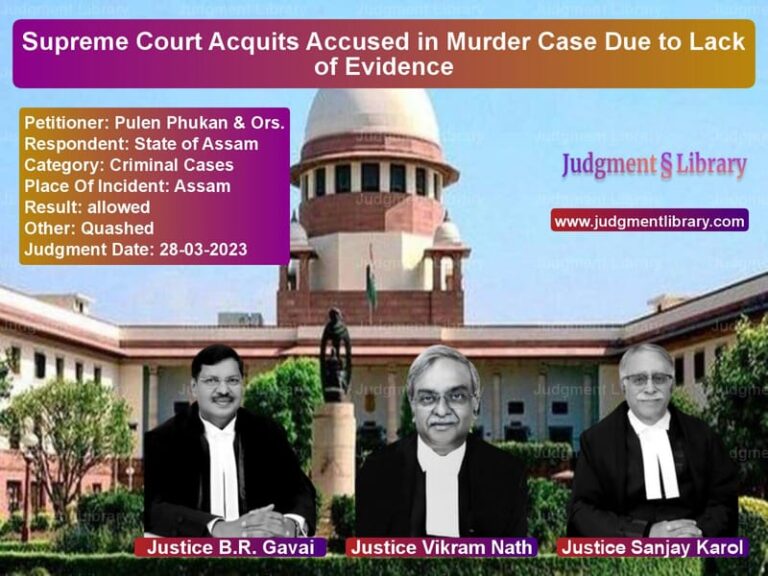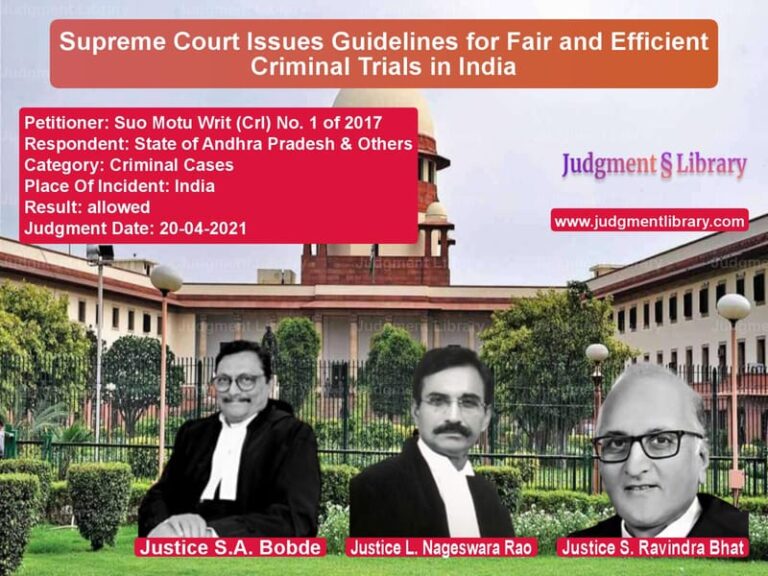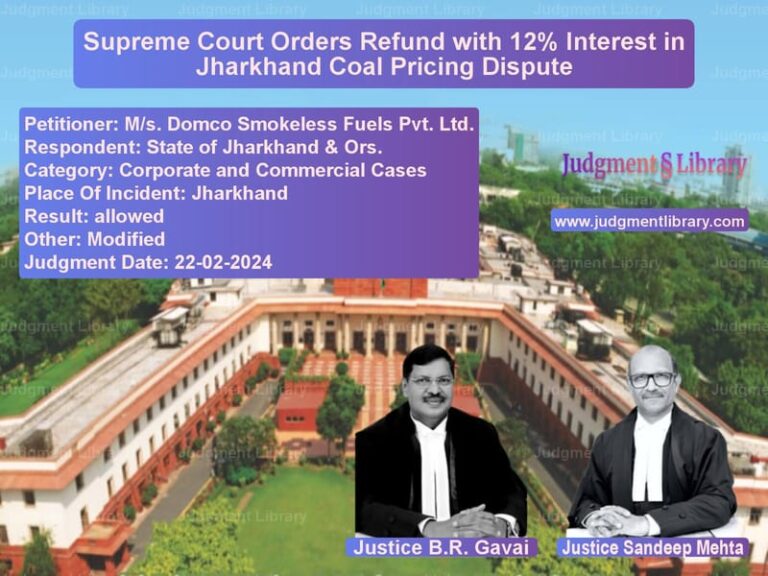Vatsala Shenoy vs. Joint Commissioner of Income Tax: Supreme Court Ruling on Capital Gains Taxation in Partnership Dissolution
The case of Vatsala Shenoy vs. Joint Commissioner of Income Tax (Assessment), Mysore is a significant judgment dealing with capital gains taxation in the dissolution of a partnership firm. The Supreme Court addressed the tax implications of selling a firm as a going concern and whether the proceeds should be treated as capital gains.
Background of the Case
The case arose from a long-standing dispute regarding the taxation of proceeds from the sale of a dissolved partnership firm. The assessees were partners in M/s. Mangalore Ganesh Beedi Works, a firm engaged in the manufacture of beedis since 1939. Over the years, the firm underwent multiple reconstitutions, with its last partnership deed executed in 1982.
The partnership firm was dissolved on December 6, 1987, upon the expiration of its term as per the partnership deed. However, due to disagreements among partners regarding asset distribution, a petition was filed in the Karnataka High Court under the Companies Act, 1956, seeking court-supervised winding-up of the firm.
The High Court directed the sale of the firm as a going concern. In 1994, a group of three partners (AOP-3) submitted the highest bid of ₹92 crores, and the sale was finalized. The dispute arose when tax authorities treated the proceeds received by the partners as capital gains and subjected them to taxation under the Income Tax Act.
Legal Issues Raised
- Whether the sale of a dissolved partnership firm as a going concern should be classified as a “slump sale” under Section 2(42C) of the Income Tax Act.
- Whether the capital gains tax provisions under Section 45 applied to the distribution of proceeds from the firm’s sale.
- Whether goodwill and other intangible assets could be taxed in the absence of a statutory mechanism before April 1, 2000.
- Whether the business profits generated before the sale should be taxed in the hands of individual partners or the new association of partners (AOP-3).
Arguments by the Appellants (Assessees)
The assessees argued:
- The sale was a “slump sale” and should not be subject to capital gains tax since Section 50B (which governs slump sales) was introduced only in 2000.
- The transaction was merely a change in ownership rather than an actual sale of individual assets.
- The goodwill of the business had no acquisition cost and, therefore, could not be taxed under capital gains as per the precedent in CIT v. B.C. Srinivasa Setty.
- The firm was sold as a single unit without any specific valuation of its components, meaning the sale should not be broken into individual asset sales.
Arguments by the Respondents (Income Tax Department)
The tax authorities contended:
- The sale of the firm was a transfer of capital assets under Section 45, making the proceeds taxable.
- The transaction involved individual valuation of assets (land, building, and goodwill), not a slump sale.
- The goodwill of the business was an asset, and its sale should attract capital gains tax.
- The income from the business before the sale should be taxed in the hands of individual partners.
Supreme Court’s Judgment
The Supreme Court ruled in favor of the Income Tax Department, holding that:
1. Capital Gains Tax on Sale of Dissolved Partnership
The court held that the sale of assets of a dissolved partnership firm attracted capital gains tax under Section 45 of the Income Tax Act. It stated:
“The firm’s dissolution does not exempt its partners from tax liabilities on capital gains arising from the sale of its assets.”
2. Sale Was Not a Slump Sale
The court rejected the argument that the sale was a slump sale, stating:
“A slump sale is characterized by the absence of itemized asset valuation. Here, the assets were specifically valued and sold, making it a taxable transaction.”
3. Goodwill as a Taxable Asset
The court held that goodwill formed part of the firm’s assets and was subject to capital gains tax. It ruled:
“Goodwill, like any other business asset, has value and its transfer results in capital gains taxable under the Act.”
4. Business Profits Taxable in AOP-3’s Hands
On the issue of business income generated before the sale, the court ruled that the tax liability rested with AOP-3 and not the individual partners, stating:
“Since AOP-3 retained a portion of the proceeds for tax purposes, it was responsible for paying business taxes, not the outgoing partners.”
Key Takeaways
- Capital gains tax applies to the sale of a dissolved partnership firm. The court ruled that dissolution does not shield partners from tax liabilities.
- A transaction with specific asset valuation is not a slump sale. If assets are individually valued, the transaction does not qualify as a slump sale under Section 2(42C).
- Goodwill is taxable under capital gains. The ruling clarifies that goodwill, though intangible, is a taxable asset.
- Business profits before the sale are taxable in the hands of the continuing entity. AOP-3 was held responsible for paying business tax, not individual partners.
Conclusion
The Supreme Court’s decision in Vatsala Shenoy vs. Joint Commissioner of Income Tax establishes an important precedent in taxation law. It clarifies that capital gains tax applies to the sale of a dissolved partnership firm, goodwill is taxable, and business profits before the sale should be taxed in the hands of the continuing business entity. This ruling has significant implications for partnership firms undergoing dissolution and restructuring, ensuring tax compliance in asset transfers.
Don’t miss out on the full details! Download the complete judgment in PDF format below and gain valuable insights instantly!
Download Judgment: Vatsala Shenoy vs Joint Commissioner o Supreme Court of India Judgment Dated 18-10-2016.pdf
Direct Downlaod Judgment: Direct downlaod this Judgment
See all petitions in Income Tax Disputes
See all petitions in Tax Evasion Cases
See all petitions in Tax Refund Disputes
See all petitions in Judgment by A.K. Sikri
See all petitions in Judgment by N.V. Ramana
See all petitions in partially allowed
See all petitions in Modified
See all petitions in supreme court of India judgments October 2016
See all petitions in 2016 judgments
See all posts in Taxation and Financial Cases Category
See all allowed petitions in Taxation and Financial Cases Category
See all Dismissed petitions in Taxation and Financial Cases Category
See all partially allowed petitions in Taxation and Financial Cases Category







